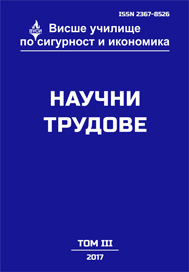Терористичните „франчайзи“ на „Ислямска държава“ завземат плацдарми на Филипините. Обстановката на островната група Минданао предлага отлични условия за укрепване и разрастване на терористични групировки с „двойно дъно“
The terrorist „franchisees“ of Islamic State seize maneuvering ground on the Philippines. The Mindanao group of islands provides excellent conditions for strengthening and growing of „double bottom“ terrorist groupings
Author(s): Teodor Danailov DechevSubject(s): Politics / Political Sciences, Politics, Social Sciences, Sociology, Security and defense
Published by: Висше училище по сигурност и икономика (ВУСИ)
Keywords: Philippines; terrorist hub; terrorism; Islamic radicalism; „double bottom“ organizations; Islamic State; soft targets
Summary/Abstract: The consolidation of Islamic radical groupings on the Philippines and specially on the Mindanao archipelago as a „terrorist hub“ is discussed and analyzed in the text. A special attention is payed to the Abu Sayyaf group, which officially and in a ritual way became a franchise of Islamic State. The support for Islamic State in the social media of the Philippines is discussed. Special attention is payed to the attacks on „soft targets“, like the night market in Davao City. A profile of the „Maute Group“ as a potential new franchise of Islamic State on the Philippines is presented. The development of Islamic radicalism on the Philippines is analyzed in the context of the Muslim resistance in the south territories of the Philippines. The role of the Moro National Liberation Front (MNLF), the Lumad Mindanao Peoples Federation (LMPF) and the Moro Islamic Liberation Front (MILF) is discussed in the paper. The diplomatic and conspiracy interventions of the late Libyan leader – Muammar Gaddafi in the conflicts in the Philippines are mentioned as well. In the case of the radical Islamic militant groupings in the Philippines, we face again the case of terrorist formations, which have a specific „double bottom“. Behind their universal messages of religious extremism are visible familiar tribal, ethnical and nationalistic motives. It is very indicative that the leaders of the radical Islamic groupings Islamic State Maguindanao, Ansar al-Khalifah Philippines and the Maute Group originate directly from the militant groups of the Moro ethnonationalists.
Journal: Научни трудове - Висше училище по сигурност и икономика
- Issue Year: III/2017
- Issue No: 1
- Page Range: 7-31
- Page Count: 25
- Language: Bulgarian

